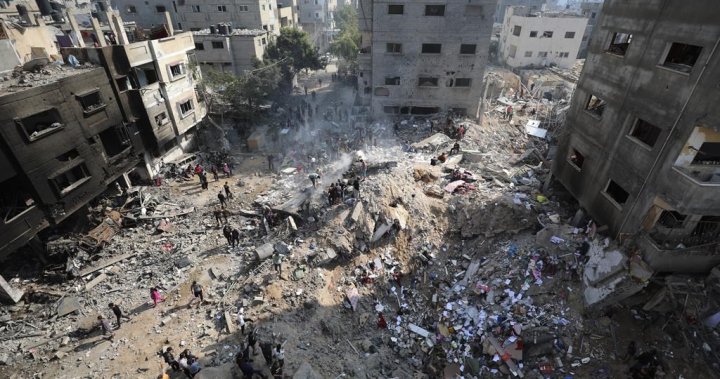In the West Bank city of Ramallah, sits a six-meter-high bronze statue of Nelson Mandela, donated by the South African city of Johannesburg in 2016. A reminder of the long-standing bond and kinship the Nobel Peace Prize winner shared with the Palestinian people.
“Despite South Africa being liberated from the senseless violence and oppression, he was able to recognize the fact that our freedom is not complete until the people of Palestine are free,” said Siyabulela Mandela, the great-grandson of Nelson Mandela.
The younger Mandela, an independent consultant on human rights, peace and conflict resolution, spoke with Global National’s Farah Nasser while in Toronto where he was interviewed on stage at the Journalists for Human Rights annual gala.
“I think he would be highly, highly disappointed,” he said, “in the leaders of today and the decisions that they are making insofar as what is currently happening.”
Mandela said that his great-grandfather, the first Black president of South Africa, was considered idealistic for thinking that there was a solution to apartheid in his country and people would consider it a miracle if it happened — and then it did.
“The world looked at us and marveled to see us as a miracle. It’s not a miracle, it’s two conflicting parties coming into a realization that the violence would never resolve the conflict. They ought to find alternative ways to deal with that conflict,” he said.
Nelson Mandela died in 2013, when Siyabulela was in his early 20s. His great-grandfather’s fight for justice inspired him to complete his doctorate of psychology in international relations and conflict management at Nelson Mandela University in South Africa.
“One of the concerning issues is that the values that we hold dear as members of society and now the values that our forefathers fought for, the values that they went to prison for — they are under threat,” he said.

Mandela is critical of world leaders who are not pressing for a ceasefire.
“If you speak of ceasefire, you are looked at with questionable judgment and how in a world that is supposed to be democratic and free and fair,” he said.
South Africa recalled its diplomats from Israel last week to assess its relationship with the country as civilian casualties rise in Israel’s conflict with the Palestinian militant group Hamas in the Gaza Strip.
South Africa has long rallied behind Palestinians, likening their plight to South Africa’s before the end of apartheid in 1994.
“Israel’s 55-year occupation of Palestine is apartheid,” said Michael Lynk, a U.N. special rapporteur on human rights in the occupied Palestinian territory, “a political regime intentionally prioritizing fundamental political, legal and social rights to one group over another in the same space on the basis of racial-national-ethnic identity.”
Israeli governments over the years have rejected that criticism arguing Israel is the only democracy in the Middle East, amidst security challenges.
Western allies of Israel have also pushed back on the label. In July, the U.S. House of Representatives passed a resolution stating that Israel is not a “racist or apartheid state.”
Mandela says what is happening is clear and that his family experienced it firsthand.
“The signs are pointing to the fact that each and every step from land dispossession to systemic violence, to our continuation of occupation and the continued senseless violence, the genocides that are happening, it points to the effect of exactly the characteristics of what apartheid regime was in South Africa,” Mandela said.

A group of several U.N. special rapporteurs said Thursday there was ”evidence of increasing genocidal incitement” against the Palestinian people in what it said were “grave violations” committed by Israel.
Israel has previously said allegations of genocide are deplorable and that its actions target militants of the Hamas group that rules Gaza, not civilians. Israel accuses Hamas of hiding behind civilians and setting up command centres beneath hospitals, something Hamas denies.
“We must criticize Hamas for actually waging a senseless violence against civilians. It should be considered as a war crime. And the same in the same vein. What Israel is doing, the senseless violence towards a civilian, it should equally be labeled as a war crime. It should equally be legal as a crime against humanity,” Mandela said.
— With files from Reuters
© 2023 Global News, a division of Corus Entertainment Inc.



